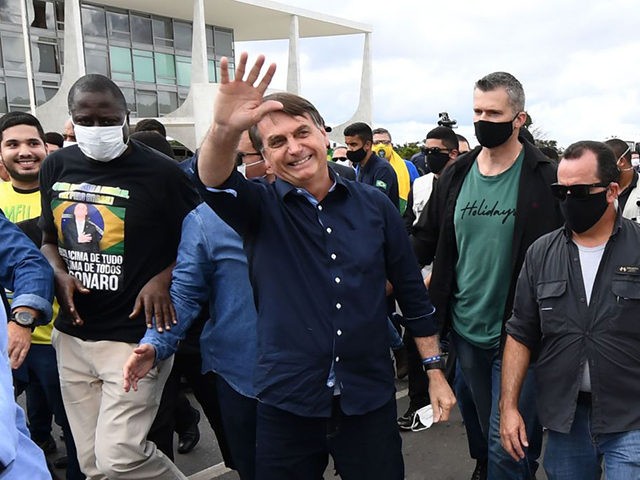The left-leaning Datafolha firm published a poll Sunday revealing conservative Brazilian President Jair Bolsonaro’s approval rating is at a record high.
The poll found 37 percent of those surveyed ranked Bolsonaro’s performance as president as “great” or “good,” while 32 percent rated it as “bad” or “terrible.” The negative rating dropped two points from the last poll, taken in August.
Bolsonaro’s lowest approval ratings were recorded in June 2020, when the country experienced a minor constitutional crisis as the federal and local governments clashed over the imposition of lockdown measures. In a survey released that month, the conservative hit a disapproval rating of 44 percent, approval of 32 percent, and 23 percent claimed not to have an opinion.
The left-wing newspaper Folha de Sao Paulo noted Bolsonaro’s approval rating nearly two years into his presidency is somewhat lower than those of his predecessors. At this point in their terms, Presidents Fernando Henrique Cardoso (45 percent), Luiz Inácio Lula da Silva (47 percent), and Dilma Rousseff (62 percent) all enjoyed significantly higher approval ratings.
The favorability of these leaders, particularly Rousseff and Lula, has plummeted in the aftermath of their presidencies after they were caught up in corruption allegations.
Lula was sentenced to 12 years in jail in 2018 on charges of money laundering related to the wider corruption scandal known as “Operation Car Wash.” He was released last November after serving less than 18 months of his sentence.
In 2016, Rousseff was impeached and removed from office for breaking budgetary laws and failing to properly investigate corruption allegations within the Brazilian state-run petroleum company Petrobras. Her impeachment followed mass nationwide demonstrations demanding her removal as details of the country’s wider corruption crisis continued to emerge. Cardoso, who left office in 2002, has also faced multiple allegations of corruption, although serious investigations into the claims have never come to fruition.
Bolsonaro has risked much of his reputation on his approach to the Chinese coronavirus pandemic, which has been one of skepticism towards economic lockdowns and encouraging open businesses, schools, and general normalcy. As Brazil has a federal system, governors of individuals states have the power to lock down economies, not Bolsonaro. So, Bolsonaro’s position has manifested more as public opposition to governors for locking down their states than enacting specific policies.
Brazil has one of the highest rates of coronavirus cases and deaths in the world during this pandemic, documenting over 6.9 million confirmed coronavirus cases and 181,000 deaths. Brazil has the second-highest death rate in the world and the third-highest number of cases, though these rankings do not take into consideration extensive evidence that rogue states like China, Russia, and Iran are deliberately underreporting cases and misclassifying deaths.
Bolsonaro, who tested positive for the Chinese coronavirus in June and recovered in less than a month, has publicly described the disease as a “little flu” and repeatedly refused to wear a mask in public, leading to a federal judge ordering him to do so.
He has also publicly promoted hydroxychloroquine, an anti-malarial drug, posting videos of himself taking the drug to fight the Chinese coronavirus. No scientific research has confirmed that hydroxychloroquine has any significant effect in treating coronavirus.
Last month, Bolsonaro became involved in a public spat with his Health Minister Eduardo Pazuello and the governor of Sao Paulo, Joao Doria, after Bolsonaro blocked the purchase of thousands of coronavirus vaccine candidates from China arranged by the two men amid concerns about its safety. Doria, who supported Bolsonaro in the 2018 elections, has advocated for statewide compulsory vaccination. He is also seen as a potential candidate to run against Bolsonaro in the 2022 presidential election.
“The Brazilian people will not be anyone’s guinea pig,” Bolsonaro wrote on Twitter at the time. “My decision is to not purchase such a vaccine.”
Follow Ben Kew on Parler, Facebook, or Twitter. You can email him at bkew@breitbart.com.

COMMENTS
Please let us know if you're having issues with commenting.